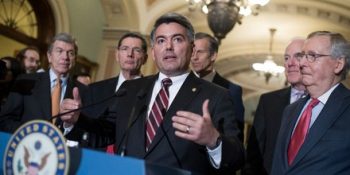WASHINGTON D.C. — Prior to President Trump’s meeting with Chinese President Xi later this week, Senators Cory Gardner (R-CO) and Brian Schatz (D-HI), along with 11 of their Senate colleagues, today sent a letter urging the President “to pursue a multifaceted and results-focused agenda that encompasses pressing security challenges; equitable economic engagement; as well as human rights and rule of law in China.” Specifically, the letter demands that President Trump ask China to take immediate action to stop North Korea and to cease its destabilizing activities in the East and South China Seas. The letter also asks President Trump to express unwavering U.S. support for Taiwan and to raise China’s behavior in cyberspace that threatens U.S. economic and national security interests.
Senators Marco Rubio (R-FL), Joe Manchin (D-WV), Mike Crapo (R-ID), James Lankford (R-OK), Todd Young (R-IN), Mike Enzi (R-WY), Orrin Hatch (R-UT), John Thune (R-SD), Roger Wicker (R-MS), Jim Inhofe (R-OK), and Dan Sullivan (R-AK) also signed the letter.
The letter reads in full:
Dear Mr. President:
As you prepare for your first summit with the President of the People’s Republic of China, Xi Jinping, we write to ask you to pursue a multifaceted and results-focused agenda that encompasses pressing security challenges; equitable economic engagement; as well as human rights and rule of law in China.
We believe that a mature, productive, and peaceful relationship with Beijing is in the national security and economic interests of the United States. While the United States can and should seek to engage China, we must be clear-eyed about Beijing’s actions and intentions, and build a long-term strategy accordingly.
As you prepare to meet with President Xi, we hope that you make it clear that China’s recent foreign and domestic policy decisions threaten to undermine the U.S.-China relationship, as well as opportunities for our two countries to advance peace and security in the Asia-Pacific region and the world. In order to strengthen the U.S.-China relationship, we recommend an agenda that addresses the following issues:
First, we believe that the most urgent challenge between our two nations is the coming nuclear crisis on the Korean peninsula. In 2016, North Korea conducted 2 nuclear tests and 24 ballistic missile launches. We believe that Kim Jong Un is committed to developing his nuclear and ballistic missile programs with one goal in mind: to develop a nuclear-capable ballistic missile that can reach Seoul, Tokyo, and most importantly, the United States.
We ask that you make clear to President Xi that the North Korea challenge can only be solved with a firm commitment from both our countries to pressure Pyongyang to stop its illicit activities. As part of our determination, we ask you to reiterate that the Administration will fully enforce the North Korea Sanctions and Policy Enhancement Act, including imposing secondary sanctions on any Chinese entities that are aiding Pyongyang. In addition, we ask you to reiterate that China must faithfully implement all U.N. Security Council resolutions with regard to North Korea, particularly Resolutions 2270 and 2321 negotiated last year, which require China to drastically reduce coal imports from North Korea. China’s record in this regard has been lackluster so far. President Xi should understand that while the United States seeks China’s cooperation, we will use every economic, diplomatic, and if necessary, military tools at our disposal to deter Pyongyang and to protect our allies.
Second, we ask you to relate to President Xi that Beijing’s escalation of tensions in the East and South China Seas are contrary to international law, increase the risk of armed conflict, threaten the global economy, and necessitate a strong U.S. and regional response.
Since 2013, according to the Department of Defense, China has reclaimed over 3,200 acres of artificial features in the South China Sea and subsequently built facilities with potential military uses on these islands, including airstrips, hangars, harbors, anti-aircraft batteries, radars, and structures that could house surface-to-air missiles.
On July 12, 2016, an international tribunal in The Hague ruled that China violated the sovereignty of the Philippines with regard to maritime disputes between the two nations and we ask you to reiterate that Beijing must unequivocally abide by this ruling.
In response to these destabilizing activities, we believe that you should enforce with President Xi that the U.S. defense posture in the South China Sea should remain exactly what then-Secretary of Defense Ashton Carter said at the Shangri-La Dialogue in Singapore on May 30, 2015: “The United States will fly, sail, and operate wherever international law allows, as U.S. forces do all over the world. America, alongside its allies and partners in the regional architecture, will not be deterred from exercising these rights — the rights of all nations.”
We also ask you to impress upon President Xi that the strong U.S. relationship with Taiwan is non-negotiable, including defensive commitments outlined in the Taiwan Relations Act as well as the Six Assurances offered by President Ronald Reagan.
Third, as the top two economies in the world, our nations are inextricably linked and we must continue to build a trade partnership that benefits U.S. companies and U.S. exporters. However, this engagement also means ensuring that China plays fair.
We ask you to reiterate to President Xi that China must stop its state-sponsored and state-endorsed theft of foreign intellectual property. According to a report by the Intellectual Property Commission, chaired by Admiral Dennis Blair and Ambassador Jon Huntsman, theft of U.S. intellectual property is estimated at over $300 billion annually—and China accounts for about 50-80 percent of that amount. China must understand that this behavior is unacceptable, antithetical to international norms, and will have serious consequences.
Fourth, we ask that you reiterate to President Xi that China’s state-sponsored or state-endorsed malicious cyber activities negatively impact U.S. businesses, U.S. national security, and our bilateral ties. We also ask that China reaffirm their intent to implement the September 2015 cyber commitments, which include combatting malicious cyber activity and hacking, and not conducting or knowingly supporting cyber-enabled theft of intellectual property for commercial gain. The United States and China should also continue efforts to develop peacetime norms for responsible state behavior in cyberspace. These norms are critical to keeping activities in cyberspace from inadvertently escalating and increasing the possibility of armed conflict.
Finally, we ask you to raise China’s deplorable human rights record. Chinese authorities are intensifying human rights abuses and are cracking down on civil society. According to the State Department’s 2015 human rights report on China: “Repression and coercion markedly increased during the year against organizations and individuals involved in civil and political rights advocacy and public interest and ethnic minority issues.” This behavior is simply unacceptable from a nation that wants to be thought of as respectable global power. We hope that you will remind President Xi that its actions on human rights are central to China’s relationship with the United States.
The U.S.-China relationship is perhaps the most consequential in the world. We believe that framing the summit around these issues will reiterate to Beijing that while the United States is committed to building a positive bilateral agenda, it cannot be built on the basis of coercion and outside of international legal norms.
We look forward to your reply and wish you a successful and productive summit.
Sincerely,







